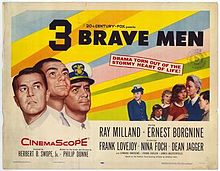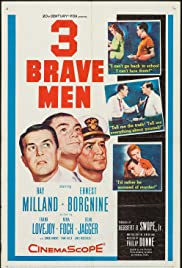Three Brave Men *** (1956, Ray Milland, Ernest Borgnine, Frank Lovejoy, Nina Foch, Dean Jagger) – Classic Movie Review 11,075
‘Heart-Warming Story Of One Man And His Family Caught Up In The Merciless Web Of Rumor, Gossip And Prejudice!’
Writer-director Philip Dunne’s sincere 1956 20th Century Fox CinemaScope widescreen black and white Cold War drama Three Brave Men is the disturbing and moving true story of naval office worker Bernie Goldsmith (Ernest Borgnine), a long-time Maryland civilian employee of the US Navy who seeks the help of capable attorney Joe DiMarco (Ray Milland) when he is forced to resign because he is deemed a security risk and his security status is called into question.
Investigators discover he had communist affiliations in his youth so he has to fight official charges of being a Communist sympathiser. Naturally, he is deserted by former friends and harassed by the community, though a Protestant minister and a Catholic neighbour rally to Bernie’s side. In court Lieutenant Mary Jane McCoy (Nina Foch) paints a suspicious picture of Bernie in the Navy’s eyes, while some witnesses discredit themselves in anti-Semitic tirades about Jewish control of industry or a Jewish-Communist conspiracy.
It is obviously a film of very great interest, but it is harmed by the compromises made. Though it is a shame that the drama, based on articles by Anthony Lewis, remains on rather tepid and uninspired side, no doubt because of the need for careful skirting round the important issues involved but also because of sinister-sounding ‘voluntary censorship’ of the day, this film is important and significant. It is carefully written and handled, and extremely competently performed by the decent cast, with Borgnine and Milland interesting as always, both of them pretty much ideal.
Though it identifies international Communism as the threat, it still manages to be highly critical of the Red Scare of the early 1950s, and has a lot of say about the times, as much as Dunne was allowed to say, even at this point in the era. It was probably quite a brave movie to make in its time, as is unimaginable that a major Hollywood studio would make such a film in later eras.
The film is based on a real-life US government employee, Abraham Chasanow, who worked for the Department of the Navy and lived in the city of lived in Greenbelt, Maryland, and was investigated as a security risk in 1954-55. Chasanow’s name is changed to Bernie Goldsmith in the film for which Chasanow served as an adviser.
The title was originally called The Chasanow Story but was changed to Three Brave Men, based on the title of a newspaper editorial after Chasanow had been reinstated.
20th Century Fox submitted to the US Navy in July 1956 a copy of the screenplay for review as a general cooperative act of ‘voluntary censorship’ routinely practised at the time when a film involved the US military. Thomas S Gates Jr, the acting Secretary of the Navy, found the screenplay ‘misleading’ and requested Dunne to produce a revised version making it clear that ‘the Chasanow case was far from being a typical case and that under current procedures it could not happen again.’ Gates also removed direct references to anti-Semitism as a motivation for the proceedings against Chasanow. Another draft was required to identify international Communism as the threat that required rigorous security procedures.
Dunne says in his autobiography he regrets he did not make the film he planned, ‘a Kafkaesque tale of the denial of human rights, a story (the true one) of unseen terror, of a man fighting in the dark against unseen enemies, unable to draw upon his constitutional rights to defend himself.’
He writes that the film’s point of view became that of the US Navy and its crusade to maintain security, making only a rare mistake. The film’s closing words delivered by a Navy official whitewashed the Navy’s responsibility for Chasanow’s persecution: ‘A free country learns from its mistakes. I offer you the Navy’s apology for the grave injustice you’ve suffered.’
Philip Dunne and directors William Wyler and John Huston formed the Committee for the First Amendment to protest against the procedures of the House Un-American Activities Committee. Dunne’s Malibu (CA) home was a hot spot for Hollywood’s liberal and progressive activists for decades, notably during the Senator Joseph McCarthy-led Red Scare era of the 1950s and the later Vietnam War era. Meetings were held there for both local and national issues. He was one of the founders of the American Screen Writer’s Guild.
Also in the cast are Nina Foch as Lieutenant Mary Jane McCoy, Dean Jagger as John W. Rogers, Secretary of the Navy, Virginia Christine as Helen Goldsmith, Edward Andrews as Mayor Henry L. Jensen, Frank Faylen as Enos Warren, Diane Jergens as Shirley Goldsmith, Warren Berlinger as Harry Goldsmith, Andrew Duggan as Pastor Stephen Browing, Joseph Wiseman as Jim Barron, James Westerfield as Chief of Police Timothy Aloysius O’Reilly, Richard Anderson as Naval Lt. Bill Horton, Olive Blakeney as Miss Victoria Scott, Jason Wingreen as Perry, Virginia Christine, Olive Blakeney, Robert Burton, John Archer, Fern Barry, Edith Clair, John Close, Juanita Close, Samuel Colt, Tom Daly, Sandy Descher, Patty Ann Gerrity, Barbara Gould, Leonard Graves, Jonathan Hole, William Hughes, Selmer Jackson, Walter Woolf King, Helen Mayron, Joe McGuinn, Ray Montgomery, Gene O’Donnell, Lee Roberts, Keith Vincent and Carleton Young.
Three Brave Men is directed by Philip Dunne, runs 88 minutes, is made and released by 20th Century Fox, is written by Philip Dunne, is shot by Charles G Clarke in black and white and CinemaScope, produced by Herbert B Swope Jnr, scored by Hans J Salter, and designed by Lyle R Wheeler and Mark-Lee Kork.
© Derek Winnert 2021 Classic Movie Review 11,075
Check out more reviews on http://derekwinnert.com



